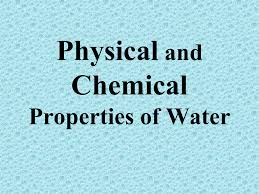Water is a chemical substance and its chemical formula is H2O. In one molecule of water, there is one oxygen and two hydrogens. Unlike most of the common liquids, water has a higher melting point, boiling point, and the heat of vaporization. It is a clear indication that strong forces of attraction occur between the adjacent water molecules. The molar specific heat capacity for water is the second highest than the other substances. High molar specific heat and high heat of vaporization are the unusual properties of water that allow it to moderate the climate of the earth by buffering the larger fluctuations in the temperature of the atmosphere.
Mainly water exists in the three states such as ice (solid), the water (liquid), and the water vapor (the gaseous state). In nature, water appears in the form of all three states of the matter and it may take different forms on the earth. It occurs as clouds and water vapors in the sky, icebergs, and seawater on the polar oceans, as rivers and glaciers in the mountains, and as a liquid in the aquifers in the grounds. Without water, the concept of life on earth is not possible.

Following are the properties which make water a unique substance for sustaining life.
- Water is odorless and tasteless liquid at all the standard pressure and temperatures. Intrinsically, the color of ice and water is slightly blue, however, in the small quantities it appears colorless. Ice is also colorless and essentially the water vapor is invisible as a gas. Water is transparent and due to this outstanding quality of water; the sunlight can reach the bottom of water bodies and aquatic life can easily live there.
- As compared to other liquids water has high thermal conductivity, surface tension, dipole moment and higher specific heat. Due to these properties water has a unique significance in the biosphere.
- The electronegativity of the oxygen atom is higher than the hydrogen so, a water molecule is not linear. Oxygen has a slight negative while hydrogen has a slight positive charge. Resultantly water is a polar molecule and has a dipole moment. The electrical conductivity of pure water is low but it significantly increases by dissolving the small amount of ionic material such as sodium chloride.
- Water is called a universal solvent due to its good solvent characters. All the major components of the living cells such as polysaccharides, proteins, and DNA are soluble in the water.
- At 3.98-degree Celsius, water has maximum density. Water has an anomalous property to become less dense when it is cooled to the solid form (ice). In the solid-state water expands to occupy the 9% more volume and due to this reason ice floats on the liquid water.
- Water is amphoteric in nature as it can act as both base and acid. Water has significant importance in the redox reactions as it can be reduced and it can be oxidized as well. Due to the dielectric constant, the hydrating tendency of water is very strong. Water can dissolve many ionic compounds so ionic and covalent compounds can be hydrolyzed in the water.